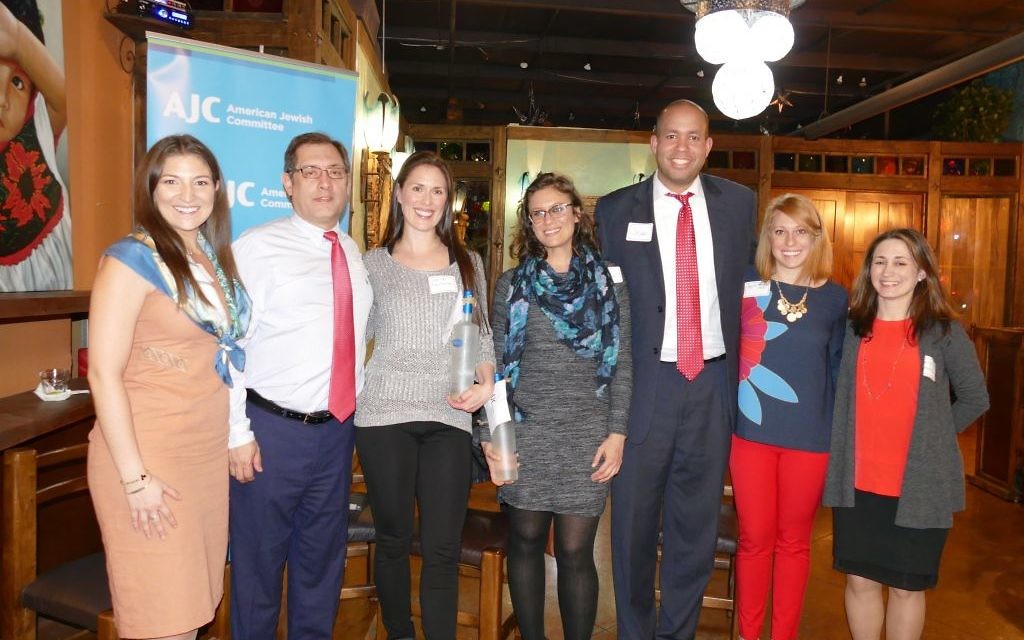Latin Jews Struggle With Communal Confusion
Latin Jews share stories in preserving their identities at AJC's Hava Tequila: A Night of a Little More.

Desiree Nathanson, an Atlanta Hawks trainer, seldom faced anti-Semitism growing up in Sarasota, Fla., where her mother served as a synagogue cantor. But her experience changed when she entered the workplace.
“I hardly think about my Jewish identity because it is a part of me,” Nathanson said. “However, when I began bartending and relayed the tab, my customers often made remarks such as, ‘Hey, don’t Jew me,’ and when I exclaimed I was Jewish, the following line always ensued: ‘That’s funny, you don’t look Jewish.’ ”
Nathanson alongside other Jews and Latinos shared their experiences during Hava Tequila: A Night of a Little More Charla, a collaboration between American Jewish Committee’s ACCESS and the AJC Belfer Institute for Latino and Latin American Affairs on Wednesday, April 5, at No Mas! Cantina.
Get The AJT Newsletter by email and never miss our top stories Free Sign Up
At the University of Florida, Nathanson performed with the Dazzlers dance team and traveled all over the country while being exposed to different ethnicities. “I think we all strive to surround ourselves with diverse people, and college allowed me to do that by branching out,” Nathanson said. “Our Jewish identity is such a big part of us, and you don’t realize how much it influences you until you encounter various forms of anti-Semitism.”
Maintaining a Latin identity was more difficult for Jason Esteves, an at-large representative on the Atlanta Board of Education and an assistant general counsel at Equifax.
“Growing up as an Afro-Latin male was a sensitive subject for me and often led me to ask myself, ‘Am I one or the other?’ In the Latin community, if you’re not Mexican, you’re black, but I was neither. I was Puerto Rican. I knew my Hispanic roots but was categorized into one identity,” Esteves said.
When he moved to Orlando, he was thrown for a bigger identity loop because Puerto Ricans thought he was black.
In time, Esteves became more comfortable with his Latin identity. “I came to realize that Latinos come in a range of shades, which made me more comfortable about my position on the Board of Education. My past experiences and identity have allowed me to build bridges among racial issues within the Latin community.”
Embracing her Jewish identity became a part of Michelle Mazier’s career as the director of Welcoming Atlanta, a public-private initiative that strives to integrate refugees and undocumented immigrants through civic engagement.
“I think we need to focus on the similarities among people, which is something that is desperately needed right now,” Mazier said. After hearing stories about how her grandparents fled Russia, she became passionate about using her skills for public service when she witnessed the backlash against undocumented youths. “My orientation and experience in the Jewish community have been eye-opening and shaped my ideology.”
Growing up as a Latin Jew in Colombia was fairly easy, said Jose Montero, the deputy director of the Centers for Disease Control and Prevention.
“No one really cared about one’s religion, as it should be for every ethnic Jew,” Montero said. In the United States, Montero discovered that things are not always as they appear. He was categorized as Hispanic and Puerto Rican even though he thought he was white in Colombia.
Montero often was approached by fellow congregation members who thought he was Puerto Rican. “I was surprised that highly educated Jews were adopting a discriminatory behavior toward me and had a preconceived notion of Jewish Latinos within the community.”
He said his ethnicity and Jewish identity were not main components of his childhood, but “to this day I still go to a kosher supermarket for Passover and occasionally visit a Colombian restaurant to enjoy a meal. I am who I am.”
As one of the evening’s co-chairs, Karina Lifschitz, who serves as a public health adviser for the CDC and is also Latino-Jewish, urged attendees to share more stories to spur a sense of togetherness within the community.




comments